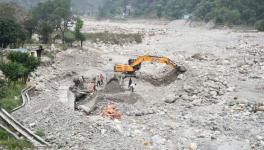Modi Govt Easing Business in Coal Mining and Thermal Power, Ignoring Ecological Concerns
Image Courtesy: Down to earth
New Delhi: Even as the Modi government is consistently watering down rules governing thermal power sector to encourage use of domestic coal, concerns of the general public are also being gradually sidelined while pushing through reforms that are apparently aimed at helping corporates who have recently forayed into commercial coal mining. On January 23, the Union Ministry of Mines issued the draft mineral auction rules giving only 13 days for stakeholders, including the general public as well as various state governments, to submit their objections and recommendations.
The notice was issued on the website of the ministry apparently as a part of the ‘Pre-Legislative Consultation Policy’ before amending extant rules. The amendment has been sought at the recommendation of a High-Level Committee headed by the NITI Aayog vice-chairman to incentivise those coal block allottees who begin operations and start production at dates earlier than those scheduled in their respective tender documents.
“The government is rolling out amendments on a routine basis and a short time window for public comments has become a norm. There is an assumption that if the amendments are made on recommendations of High-Level Committees, additional feedback can be dispensed with or minimised. All the regulatory rollouts are directed at enhancing exploration and domestic production, with no attempt to address the legacy of pending rehabilitation, land conflicts or pollution and no proposal to ascertain what injustices may unfold if mining footprint is expanded,” Kanchi Kohli of the Delhi-based think-tank, Centre for Policy Research, told NewsClick.
The ministry has fixed February 5 as the last date for inviting objections and recommendations to the draft rule. Earlier too, the Modi government has come under sharp criticism from members of the civil society and environmentalists alike for providing extremely small windows for the purpose of pre-legislative consultations in its rush to push through reforms.
Independent researcher Meenakshi Kapoor, based in Dharamshala of Himachal Pradesh, pointed out that as per rules, a minimum period of 30 days is mandatory for any draft legislation to be placed in the public domain before it is notified finally.
“There were rules framed to this effect in the year 2014. The Union government, in its bid to amend this legislation has, perhaps forgotten or overlooked the rules,” said Kapoor.
The Congress-led United Progressive Alliance (UPA) government had, in the year 2014 also, made it mandatory to provide a brief justification for amending a rule while it is placed in the public domain for stakeholders. The decision had been taken in a meeting of the Committee of Secretaries on January 10, 2014 under the Chairmanship of the Cabinet Secretary.
“The Department/Ministry concerned should publish/place in public domain the draft legislation or at least the information that may inter alia include brief justification for such legislation, essential elements of the proposed legislation, its broad financial implications, and an estimated assessment of the impact of such legislation on environment, fundamental rights, lives and livelihoods of the concerned/affected people, etc. Such details may be kept in the public domain for a minimum period of thirty days for being proactively shared with the public in such manner as may be specified by the Department/Ministry concerned,” states the minutes of the meeting.
An email has been sent to the Union Ministry of Mines, on behalf of Newsclick, asking as to on what grounds a period of 13 days only has been provided for pre-legislative consultation for the draft Mineral (Auction) Rules, 2021. No response had been received from the ministry at the time that this article was published. This article will be updated as and when a response is received from the ministry.
“In view of the HLC [High-level Committee] recommendations, it has been decided to provide in the Mineral (Auction) Rules, 2015 that for fully explored blocks, there would be a 50% rebate in the quoted revenue share, for the quantity of mineral produced and dispatched earlier than scheduled date of production as provided in tender document … The objective of the amendment is to make minerals available in the market at the earliest considering that minerals are input to several industries,” states the public notice issued by the mines ministry on January 23.
Simultaneously, in yet another attempt at diluting environmental rules for the sake of the thermal power sector, the Modi government has, in the first week of January, proposed to further extend deadlines set upon thermal power plants to achieve targeted emission norms. A deadline had originally been set upon thermal power plants for the year 2017 for installing Flue-Gas Desulphurisation (FGD) systems for controlling emission of toxic oxides of sulphur but, under pressure from industries, it had been further extended to 2022 with differing deadlines for different industries.
As per reports, this proposal, issued by the Union Ministry of Power as an office memorandum, has been sent to the Union Ministry of Environment, Forests & Climate Change for its approval.
“It is not within the domain of the Ministry of Power, in the first place, to decide on issues surrounding the environment and climate change. Secondly, a bulk of the thermal power plants are in the private sector. The ministry has no role at all in seeking to grant extension in deadlines for private industries that have failed to meet the deadline,” said environmental lawyer Ritwick Dutta.
Also read: Before Budget: Revenues Crash, Debt Mounts – But People Still Deprived
The writer is an independent journalist.
Get the latest reports & analysis with people's perspective on Protests, movements & deep analytical videos, discussions of the current affairs in your Telegram app. Subscribe to NewsClick's Telegram channel & get Real-Time updates on stories, as they get published on our website.
























